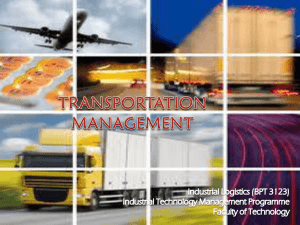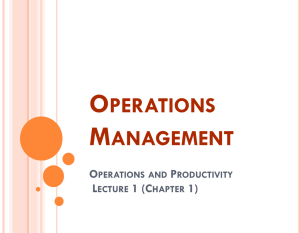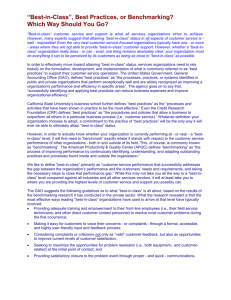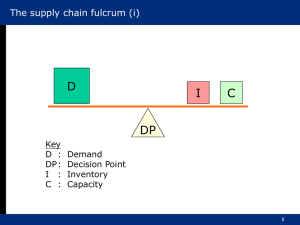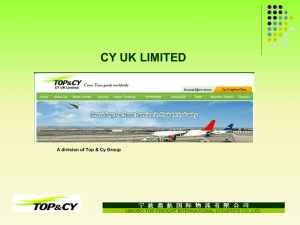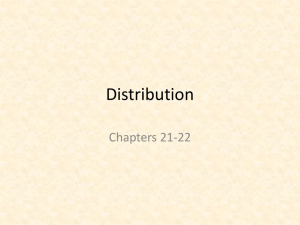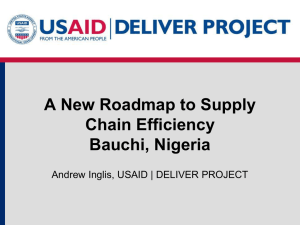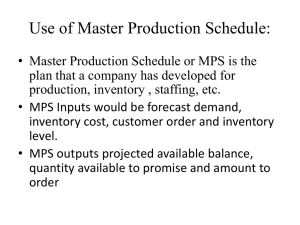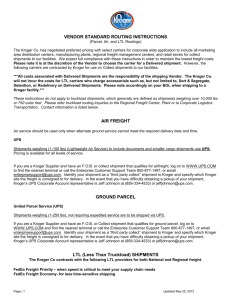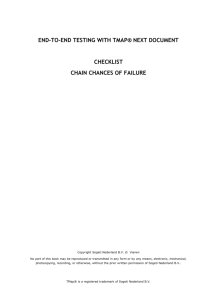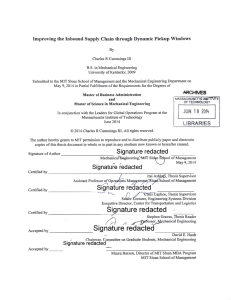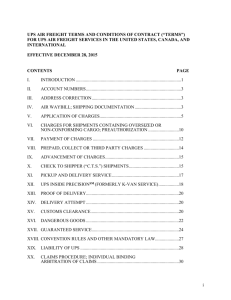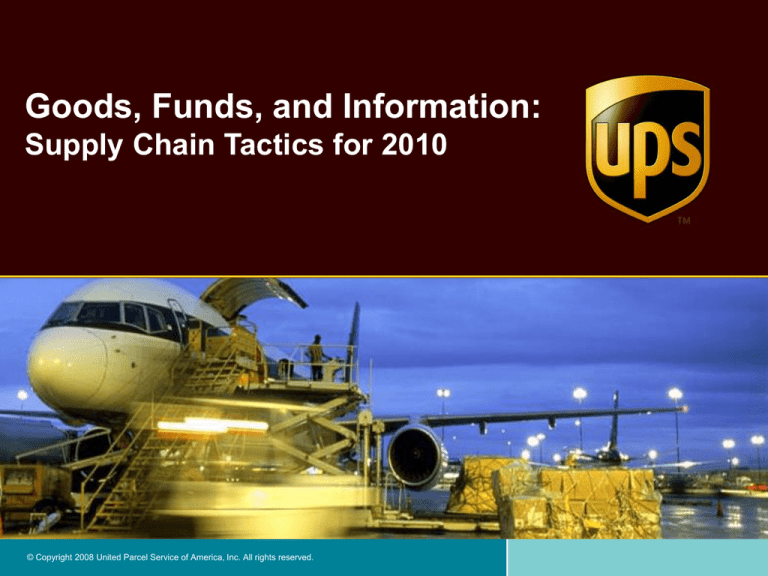
Goods, Funds, and Information:
Supply Chain Tactics for 2010
© Copyright 2008 United Parcel Service of America, Inc. All rights reserved.
The Evolving Global Supply Chain
Supplier
Manufacturer
Distributor
Retail
End
User
Manufacturer
Supplier
Retailer
End
User
Distributor
2
The Evolving Global Supply Chain
The extended global supply chain is the foundation for business
competition in 2010, and it is comprised of numerous disparate elements
Logistics and
Distribution
International
Trade
Management
Supplier
Management
Multi-Modal
Freight and
Transportation
Information
Management
Inventory
Management
Regulatory
Compliance
Order
Management
Customer
Compliance
Reverse
Logistics
Post-Sales
Support
3
The Importance of Supply Chain Integration
Decentralized, disconnected supply chain management produces
unintended consequences.
Higher
costs
Inefficiency/process
redundancy
Delays, errors
and missed orders
Poor customer
service
Slow response to
demand variability
Higher
inventory levels
Inadequate supply
chain visibility
Increased
capital investment
4
Creating Business Advantage
In good markets and bad supply chain leaders have been shown to
outperform their average competitors by a factor of two to one.
Total supply chain cost
Percent of revenue
10
9.8%
8
6
4.2%
The global supply chain directly
impacts, on average, 75% of a
business’ operating results.
Corporations with best-in-class freight
and logistics competencies benchmark
operational costs that are less than
half of those of their direct competitors.
4
They also manifest market cap growth
7%-26% above industry average.
2
0
Average
Top quartile
Sources: CFO research and benchmarking
This will be an increasingly critical
market advantage to possess in 2010
and beyond.
5
The Advantage of Effective Supply Chain Management
Corporations with integrated best-in-class supply chain management have a
distinct advantage over competitors.
Total Supply-Chain Management Cost
14
Best-in-Class
13.1
Average
12
11
12.1
10.7
10.4
10
8.3
8.5
8
8
6.6
8.6
8.5
6.9
5.6
6
4.3
4
3.7
3.4
3.1
3.4
2.8
2
2
0
Computers
Electronic
Automotive &
Medical Device,
Telecom
Chemicals &
Equipment
Industrial
Diagnostics &
Equipment
Advance Materials
Consumer Goods
Semiconductors
Pharmecuticals
Aerospace &
Defense
Equipment
Published with permission from The Performance Measurement Group, LLC, subsidiary of management
consultants PRTM. No use or reproduction without written permission
6
Success Requires Efficiency and Effectiveness
Many have focused solely on the cost side of the equation. It is equally
important to build value through enhanced coverage and capabilities.
Efficiency
Effectiveness
Pursue money-cost
and time-cost
improvement initiatives
Enable service execution
and growth: differentiate
Through value-added
execution
The approach to achieve operational competitiveness
Rationalize both agendas to create
a balanced supply chain strategy
7
Focus on Supply Chain Fundamentals in 2010
In this challenging market the global supply chain must be managed to
increase coverage, manage costs, and provide business continuity.
Actively Manage
Transportation Spend
Reduce Concentrations
Of Static Inventory
Optimize End-to-End
Distribution Network
Leverage Information
Management Tools
Improve Net
Trade Cycle
Intersect
Market Opportunity
Contain Supply
Chain Costs
Reduce
Capital Needs
Streamline Supply
Chain Processes
8
Cohesive, Sustainable Supply Chain Management
Business advantage requires active holistic management of the
interconnected flows of goods, funds, and information.
Actively Manage
Transportation Spend
Reduce Concentrations
Of Static Inventory
Optimize End-to-End
Distribution Network
Intersect
Market Opportunity
Contain Supply
Chain Costs
Leverage Information
Management Tools
Improve Net
Trade Cycle
Reduce
Capital Needs
Streamline Supply
Chain Processes
9
Information Management Creates Business Advantage
Both import and export operations require focused information
management to create business advantage:
Denied
Party
Screening
Harmonized
Code
Management
Export
License
Management
Landed
Cost
Calculation
Trade
Documents
And Forms
Shipment
Management
Shipment
Visibility
Trade
Forms and
Documents
Import
Compliance
Filings
Landed
Cost
Calculation
Harmonized
Code
Management
P.O. and
Supplier
Management
10
Compliance Management Creates Business Advantage
Compared to Industry Average, Best-in-Class companies experience
fewer processing errors and border delays, lower compliance costs and
improved productivity
Compliance Errors and Border Delays
10%
9%
8%
7%
6%
5%
4%
3%
2%
1%
0%
9.2%
Costs and Productivity
120%
96%
100%
80%
4.6%
52%
60%
3.4%
2.2%
1.7%
40%
21%
0.7%
20%
Compliance Errors
Import
Shipments Held
Best-in-Class
Export
Shipments Held
5%
0%
Compliance costs decreased
Industry Average
Best-in-Class had:
• 50% fewer orders executed with compliance errors
• 35% fewer import delays
• Nearly 60% fewer export delays
Best-in-Class
Productivity increased
Industry Average
Best-in-Class were:
• 4x more likely to have lower annual compliance costs per
international shipment than the average company
• Nearly 2x more likely to see productivity improvement in
compliance staff
Source: “Global Trade Compliance Priorities”, Aberdeen Group
11
Physical Execution is Critically Important
Effective supply chain management depends on understanding and
addressing four key imperatives:
Product
Preparation
Mode
Optimization
Strategic
Routing
Leveraging
Provider
Strengths
12
Prepare Product Strategically
Packaging – How much are you paying to ship wasted space? The
consumer electronics industry has seen its products shrink, while its
packaging has remained unchanged. Software packages, conversely,
have decreased by over 40%. Consider alternate packaging strategies.
Palletization – Shippers benefit from a well built pallet. A typical target
weight for a pallet is approximately 2,000 kilos. After the first 2,000 kilos
favorable economies of scale can be achieved.
Shipment Consolidation – The cost advantage of effective ocean
container load building has never been more pronounced. The cost
differential for a 20’ vs 40’ container is narrowing. The cost advantage of
an optimally laden container is substantial.
13
Mode Optimization: Understanding the Options
Different modes each deliver a different balance of Effectiveness (speed
and precision) and Efficiency (shipment expense and per-carton cost)
Effectiveness
10x
Cost
Efficiency
10x
Time
14
Strategic Routing: One Size Does Not Fit All
Market leaders realize competitive advantage through routing aligned to
the specific needs of their products.
26
28
40
Seasonal
Merchandise
Replenishment
Merchandise
Seasonal
16
Margin
7
Geography
6
High Velocity
Merchandise
Demand
Time in Transit
5
High Margin
Merchandise
Basic Solutions
3
Complex Solutions
Appendix
E: Competitive Analysis
Customer Ready Store Ready Pooler Ready DC Ready
Low Service Standards
High Service Standards
Shelf Life
2 November 2004
RWG Draft (Confidential)
55
15
Leverage Service Provider Strengths
Operational Scale
Procurement research shows that doubling volume on a trade lane can
decrease overall purchased transportation expense by 2% - 6%.
The fastest route to achieving this scale advantage is to leverage the
spend of top-tier supply chain integrator.
This is particularly advantageous for smaller shippers which
dramatically benefit from effective consolidation solutions, such as LCL
ocean or LTL surface freight.
Information Management
71% of corporations report that their primary global trade management
system is ‘paper and spreadsheets’.
Only 33% of average corporations currently utilize their logistics
provider’s global information management systems…
… versus nearly 60% of the corporations in the top five leadership
positions for their industries.
Source: Monitor, and UPS primary research
16
Integrated Supply Chain Example: Trade Direct
A complete, integrated, multi-modal solution
PICKUP /
CONSOLIDATE
SHIPMENTS
CLEAR
CUSTOMS
DECONSOLIDATE
SHIPMENTS
FINAL
DELIVERY
FULL VISIBILITY: End-to-end tracking provided throughout the supply chain.
Freight and
individual
packages are
picked up and
consolidated
Consolidated
shipment crosses
the border in a
single customs
clearance
Freight moves
via LTL
Packages enter
UPS package
delivery
network
Package and LTL
shipments are
delivered direct to
multiple retail
stores and/or end
customers
17
Integrated Supply Chain Example: TradeAbility
18
Effective Supply Chain Management in 2010
Business advantage is created through end-to-end management of
goods, funds, and information.
Visibility
Consolidation
Export Formalities
Commercial Docs
Cargo Insurance
Inland Transport
Multi-Modal Transport
Inland Transport
Distribution
Supplier Management
Local Pick-Up
Customs Clearance
Deconsolidation
Local Delivery
Financial Solutions
Visibility
Compliance Solutions
19
Active Supply Chain Management Creates Advantage
Effective management of end-to-end freight and ancillary functions can
reduce total distribution cost by up to 5%, with the same impact on profit in
many segments as a 30% increase in sales.
Retail Business Improvement Through End-to-End Supply Management
Reduced Stock-Outs
2%-8% improvement
Lower Inventory Levels
10%-40% improvement
Increased Sales
5%-20% improvement
Manufacturing Business Improvement Through End-to-End Supply Mgmt
Lower Inventory Levels
10%-40% improvement
Faster Replenishment Cycles
12%-30% improvement
Higher Sales
2%-10% improvement
Better Customer Service
5%-10% improvement
Sources: Benchmark analysis
20
Thank you
www.ups.com
© Copyright 2008 United Parcel Service of America, Inc. UPS, the UPS brandmark and the color brown are trademarks of Untied Parcel Service of America, Inc. All rights reserved.

